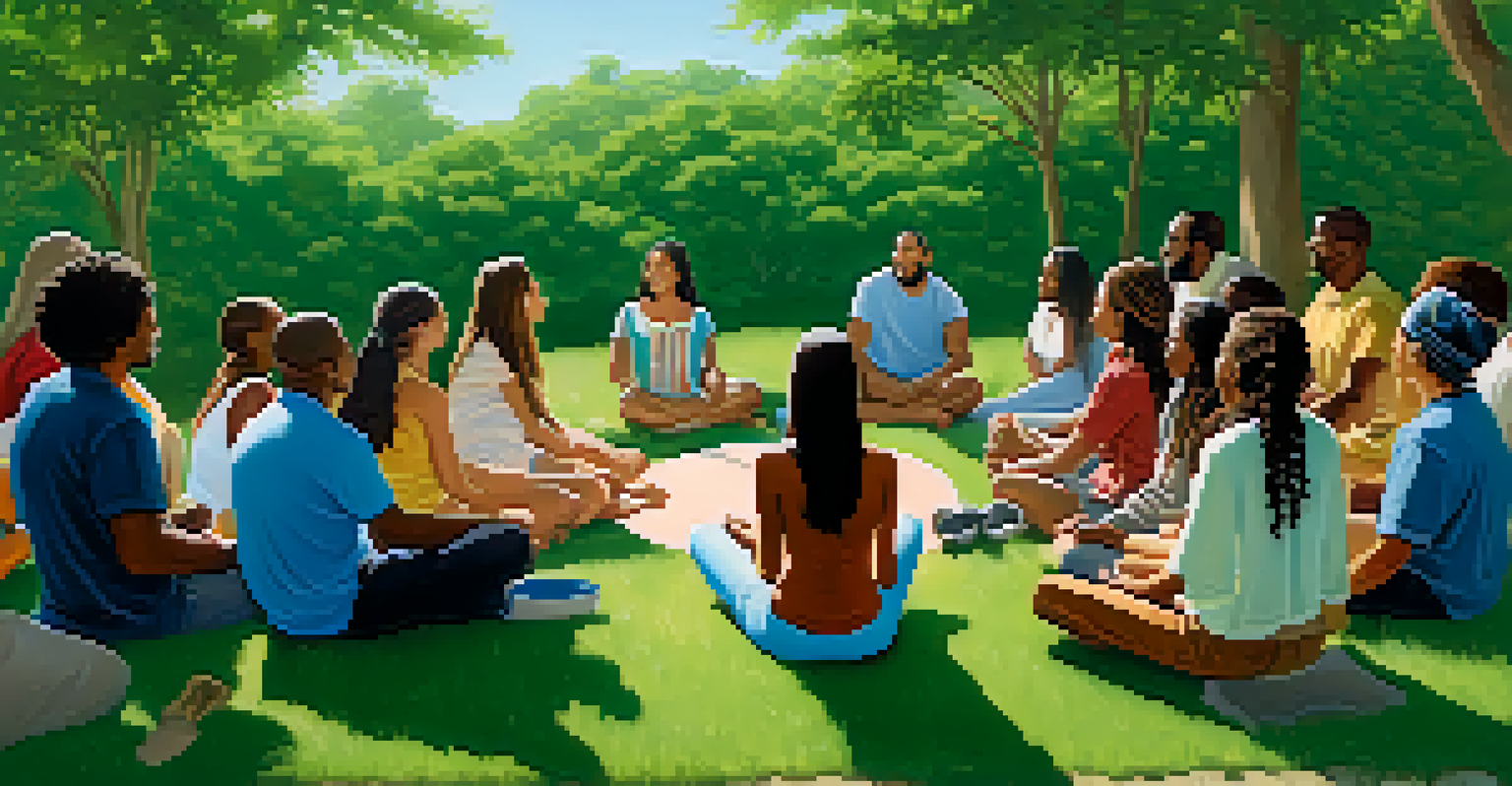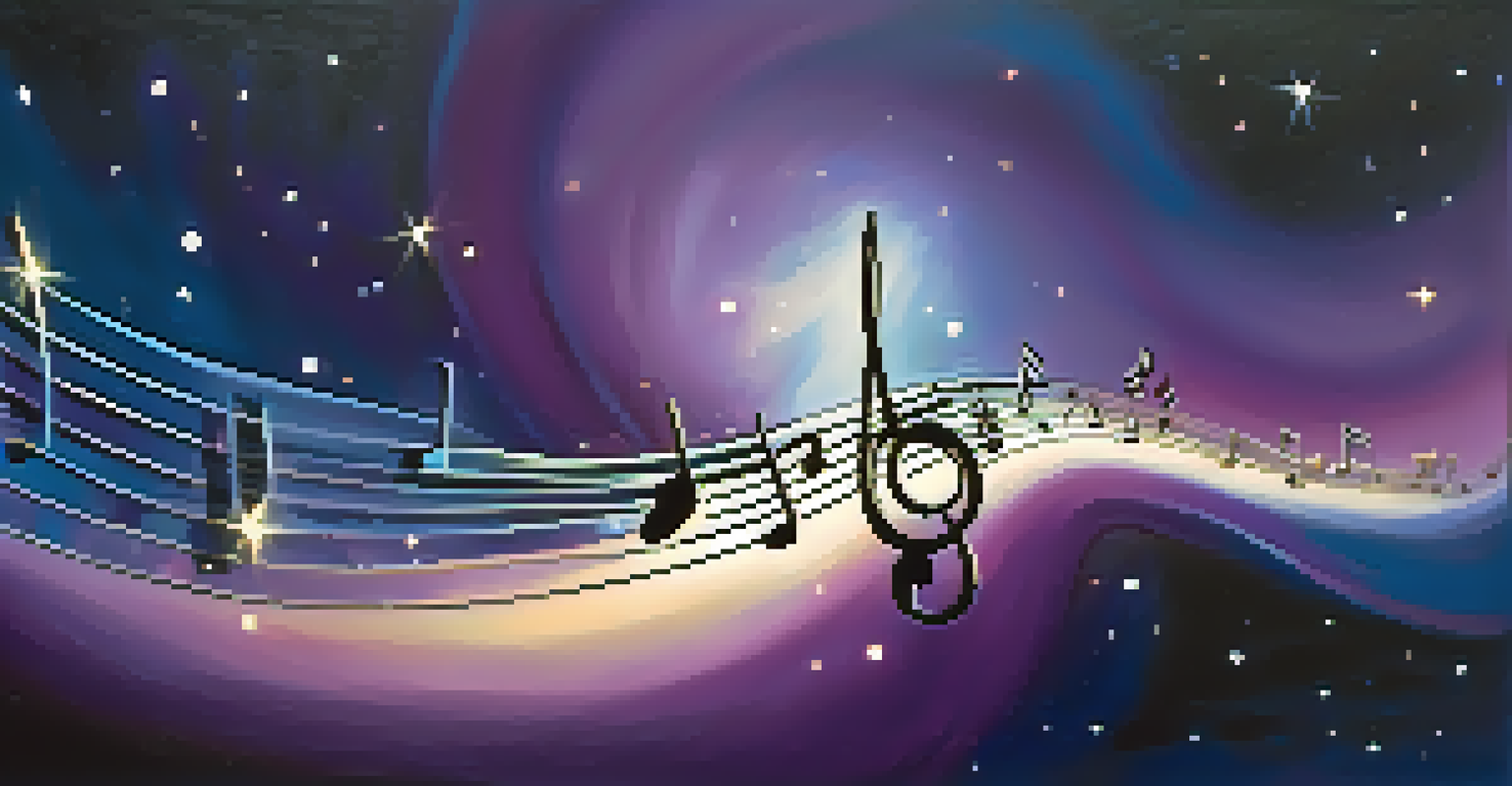The Science Behind Music's Impact on Spiritual Experiences

Understanding the Connection Between Music and Spirituality
Music has been an integral part of human culture for centuries, often intertwined with spiritual practices. From ancient rituals to modern ceremonies, music serves as a bridge between the tangible and the ethereal. This connection is rooted in our emotional responses; music can evoke feelings of joy, sadness, peace, and even transcendence. By tapping into these emotions, music facilitates a deeper connection to the spiritual realm.
Music can change the world because it can change people.
The universal appeal of music lies in its ability to resonate with listeners on a personal level. Whether it’s a haunting melody or a rhythmic chant, music can evoke memories or feelings that align with personal beliefs and spiritual journeys. This resonance can create a sense of belonging and understanding, fostering a communal experience among individuals who share similar spiritual paths. Ultimately, music can amplify our innate desire for connection and transcendence.
In many cultures, music is a vital component of spiritual practices, enhancing rituals and ceremonies. Think about how a choir’s harmonies can lift spirits during worship or how drumming circles can create a sense of unity. This illustrates how music can elevate ordinary moments into profound spiritual experiences, transforming the mundane into the sacred.
The Psychological Effects of Music on Spiritual Well-Being
Research in psychology has shown that music can significantly influence our mental states. When we listen to music, it can trigger the release of neurotransmitters like dopamine, which are associated with pleasure and reward. This chemical response not only enhances our mood but can also lead to feelings of euphoria, often described as spiritual highs. By fostering positive emotions, music can play a crucial role in spiritual well-being.

Moreover, music can act as a powerful tool for mindfulness and meditation. Many people turn to soothing melodies to help them focus or to quiet their minds during meditation practices. This mindful engagement with music allows individuals to connect more deeply with themselves and their spiritual beliefs. In this way, music becomes a pathway to introspection and self-discovery, enhancing one’s spiritual journey.
Music Connects Us Spiritually
Music serves as a bridge between the tangible and ethereal, enhancing our emotional connections and fostering a sense of belonging in spiritual practices.
Additionally, the communal aspect of music can enhance feelings of belonging and support. Group singing, drumming, or even dancing together can create a shared experience that reinforces social bonds. This collective engagement can be profoundly uplifting and is often described as experiencing a higher power or connection to something greater than oneself.
Neuroscience Insights: How Music Affects the Brain
Neuroscience has begun to uncover the fascinating ways music impacts our brains, particularly in relation to spirituality. Studies using brain imaging technology show that listening to music activates various regions of the brain associated with emotion, memory, and even spirituality itself. This suggests that music can stimulate profound changes in our mental state, reinforcing its role in spiritual experiences.
Where words fail, music speaks.
One such study found that the brain's reward system is activated when individuals listen to their favorite music. This can produce feelings of pleasure and satisfaction, akin to spiritual fulfillment. The brain’s response to music can also explain why certain songs resonate with us on a spiritual level, as they may evoke memories or feelings tied to our beliefs and experiences.
Furthermore, music can alter our brain waves, inducing states of relaxation and heightened awareness. This can lead to experiences often described as spiritual awakenings or moments of clarity. By understanding these neurological effects, we can appreciate how music serves as a catalyst for spiritual exploration and growth.
Cultural Perspectives: Music in Spiritual Traditions
Across different cultures, music plays a vital role in spiritual traditions and practices. For instance, in many Indigenous cultures, songs are used in rituals to connect with ancestors and the earth. These musical expressions not only honor their heritage but also serve to reinforce spiritual beliefs and community ties. The significance of music in these contexts illustrates its universal ability to evoke spiritual sentiments.
In Eastern traditions, such as Hinduism and Buddhism, music is often incorporated into meditation and prayer. Chanting mantras or listening to instrumental pieces helps practitioners focus their minds and elevate their spirits. This practice shows how music can be a vehicle for mindfulness, guiding individuals toward a deeper understanding of their spiritual paths.
Psychological Benefits of Music
Listening to music can trigger the release of neurotransmitters, promoting positive emotions and enhancing spiritual well-being through mindfulness and community engagement.
Meanwhile, in Western religious practices, hymns and gospel music create a communal atmosphere essential for worship. These musical forms allow congregations to express their faith and connect with the divine collectively. The cultural relevance of music in spiritual practices highlights its transformative power across various traditions, uniting people in their spiritual journeys.
The Role of Rhythm and Melody in Spiritual Experiences
Rhythm and melody are two fundamental elements of music that significantly influence spiritual experiences. The heartbeat-like rhythm of certain music can evoke feelings of grounding and connection, making listeners feel more present in their bodies. This physical response can enhance spiritual practices, such as meditation or dance, by creating a sense of unity between the mind and body.
Melody, on the other hand, often elicits emotional responses that can lead to spiritual awakenings. A beautiful melody can stir deep feelings within us, allowing for moments of reflection and connection to our spiritual selves. Think of how a simple tune can transport you back to a meaningful moment in your life, reinforcing the idea that music serves as a soundtrack to our spiritual journeys.
Moreover, the interplay of rhythm and melody can create a space for transcendent experiences. When combined effectively, these elements can lead to a state of flow, where individuals feel a deep sense of connection to themselves and the universe. This phenomenon is often described as a spiritual experience, highlighting the powerful role that music plays in shaping our spiritual lives.
Personal Stories: Music's Transformative Power
Personal stories often illustrate the profound impact music can have on spiritual experiences. For many, a specific song or piece of music is tied to a significant moment in their lives, such as a wedding, funeral, or spiritual awakening. These associations highlight how music can serve as a powerful reminder of our spiritual journeys, evoking emotions and memories that shape our beliefs.
Take, for example, someone who finds solace in a particular hymn during difficult times. The familiar melody may transport them to a place of comfort and connection, reinforcing their faith and resilience. This ability to evoke comfort and strength showcases music's transformative power in navigating life's spiritual challenges.
Cultural Significance of Music
Across various cultures, music plays a vital role in spiritual traditions, from rituals and prayers to communal worship, illustrating its universal power to evoke spiritual sentiments.
Additionally, many individuals share stories of moments when music led to profound realizations or breakthroughs in their spiritual practices. Whether through a moving concert experience or the simple act of singing with friends, these moments underscore the idea that music can catalyze spiritual growth and understanding. Ultimately, these personal narratives illustrate the deep and lasting impact music has on our spiritual lives.
Conclusion: Embracing Music in Our Spiritual Journeys
In conclusion, music is a powerful ally in our spiritual journeys—a universal language that transcends cultural boundaries and personal beliefs. By understanding the science behind music's impact on our emotions and brain, we can appreciate its role in enhancing spiritual experiences. Whether through sacred rituals, personal meditation, or communal singing, music can help us connect with ourselves and the world around us.
As we navigate our spiritual paths, let’s embrace the transformative power of music. Consider incorporating music into your daily practices, whether it's listening to uplifting tunes, attending a concert, or participating in group singing. These experiences can enrich your spiritual life and foster deeper connections with yourself and others.

Ultimately, music invites us to explore the depths of our spirituality, reminding us that we are part of a larger, harmonious existence. So, let the melodies guide you and the rhythms inspire you as you continue your journey toward spiritual fulfillment.